NOW WHO DO YOU REALLY, REALLY, EREALLY BELIEVE WILL GET BAILED OUT WHEN THE BIDEN DEPRESSION SESETS IN? START WITH BLACKROCK!
National Economic Council Director Brian Deese Made the Rounds on the Sunday Shows, and He Had Quite the Spin
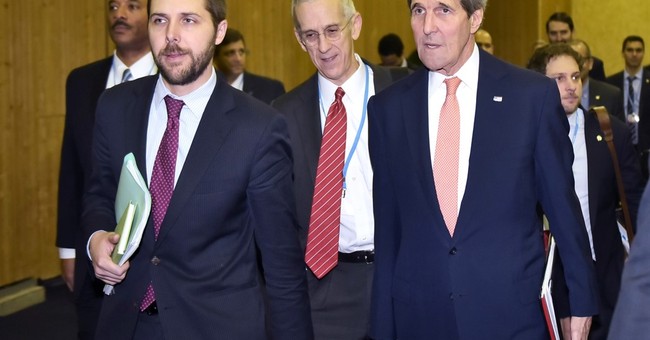
Source: Mandel Ngan, Pool photo via AP
It was a busy Sunday morning for National Economic Council Director Brian Deese, as he appeared on NBC's "Meet the Press" as well as CNN's "State of the Union," and ABC's "This Week." The various hosts asked him about concerns with inflation, which last week hit a thirty year high, as Katie covered.
While on "State of the Union," Deese's response on how to curb inflation was to advocate for the $1.75 trillion reconciliation spending bill. He did so with a popular White House talking point, that "this bill is fully paid for" and is "not going to add to inflationary pressures."
As host Jake Tapper pointed out, though, Deese did not address points brought up about an increase in gas and grocery prices.
Deese explained that "we have seen in oil and gas markets is, because of consolidation, we have fewer large companies actually controlling the market," which could lead to "price gouging or market manipulation." As a result, they've "asked the Federal Trade Commission to take a very close look at that right now in the current market conditions."
The White House has repeatedly rejected more drilling options. Further, one of Biden's first executive orders was to kill the Keystone XL Pipeline. Now he has to beg the Organization of the Petroleum Exporting Countries (OPEC) for more oil.
Tapper pointed out Americans' have a particularly disastrous view of the job Biden is doing on the economy, according to the latest poll from The Washington Post/ABC News. Deese's answer was to refer to more White House talking points, which included advocating for the $1.2 trillion infrastructure bill that passed earlier this month and reminding people about the pandemic.
Deese stuck to how "the pandemic and the economy are interlinked" and that "we're seeing these price increases in inflation globally because of the supply chain challenges associated with COVID."
Tapper even called him out on how the White House has failed to listen to the warnings from economist Larry Summers, a fellow Democrat who held Deese's role in the Obama administration.
"Is it possible that Americans are suffering now from high prices because the Biden administration overstimulated the economy with all of this money going into the economy," Tapper asked, as he brought up Summers' warnings that the $1.9 trillion American Rescue Plan was a major cause for inflation and "the least responsible macroeconomic policy we have had in the last 40 years."
Deese answered "well, no, that's not our perspective," and claimed inflation will go down next year.
While on "Meet the Press," Deese acknowledged that "there's no doubt inflation is high right now," but went on to sing the praises of the Biden administration's handling of the economy. Meanwhile, Biden is faring poorly not just in the poll mentioned above, but in multiple polls. According to RealClearPolitics (RCP), for data from October 16-November 10, Biden has a 38.6 percent approval rating on the economy and a 54.4 disapproval rating.
Host Chuck Todd mentioned "we have an economic recovery, but inflation is now outstripping the wage gains. As you can see here, year over year, wages are up nearly 5 percent, but the inflation basically eats all of it, and then some."
While Deese wanted to focus on topics like childcare, and why the spending bill will fix the problems, Todd wasn't having it. "None of that is going to impact inflation right now," Todd pointed out when Deese kept bringing up the supposed benefits of the bill. Todd would have preferred to talk about the labor shortage, such as with truck drivers. It went unmentioned though that a worsening factor for these labor shortages has to do with vaccine mandates the Biden administration is fighting to enforce.
During "This Week," the first response out of Deese's mouth was to advocate for the spending bill, using the same language as he did earlier. This included once more pointing out that the bill is "fully paid for," with Deese also offering that because of this "it doesn't add aggregate demands to the economy."
Deese even claimed that "frankly, it’s been some time in Washington since we’ve done something that’s fiscally responsible."
The bill has not yet been scored by the Congressional Budget Office (CBO), as host George Stephanopoulos pointed out, which is why it did not receive a vote in the House last week alongside the infrastructure bill.
Stephanopoulos also asked that, even if Deese is correct on this point, how the administration is going to deal with the effects of inflation in the short term. Deese's answer once more entailed how "we have to finish the job on COVID," which involves getting more people vaccinated, including children ages 5 to 11 years old, for whom the Pfizer vaccine was just recently approved.
The host pointed out that Sens. John Barrasso (R-WY) and Joe Manchin (D-WV) have also expressed concerns that the spending bill will make inflation worse, but Deese continued to claim the bill is fully paid for.
Another likely reason the administration is desperate to get the reconciliation spending as a major part of Biden's agenda is for that boost in the polls Biden is so desperate for. Even with the passage of infrastructure, as Spencer and I covered, the boost hasn't appeared yet.
Wealth-X report: Billionaire wealth surged during pandemic
A new report from research firm Wealth-X found that the global COVID-19 pandemic has intensified the growth of social inequality and witnessed an unprecedented accumulation of wealth among the most privileged layers in society. For the first time in human history, the world had more than 3,000 billionaires in 2020.
Americans Agree: the BIDEN ECONOMY SUCKS!
THE ECONOMY TAKING A TURN FOR THE WORSE, ENDLESS MONEY PRINTING WILL CAUSE MORE PAIN, HOME PRICES
Yellen: ‘It’s Important to Put Inflation in Context of an Economy That is Improving a Lot’
Treasury Secretary Janet Yellen said Sunday on CBS’s “Face the Nation” that she thought it was important to put the recent rising prices in the context of an improving economy.
Partial transcript as follows:
MARGARET BRENNAN: You have said that inflation is likely to be with us until the second half of next year. Are you confident that prices for the average American will be down by the time we head into next November and Election Day?
YELLEN: Well, it really depends on the pandemic. The pandemic has been calling the shots for the economy and for inflation. And if we want to get inflation down, I think continuing to make progress against the pandemic is the most important thing we can do. I think it’s- it’s- it’s important to realize that the cause of this inflation is the pandemic. It shut- all but shut down our economy. It boosted unemployment to almost 15% and we’ve been opening up in fits and starts. And the pandemic is really responsible, in its impact for the inflation that we’re seeing. It led to a dramatic increase in demand for- for products. Households were unable to spend on services — going out to eat and traveling. They shifted as they stayed at home, worked more from home. They shifted their spending on to goods that led to a surge in the demand for products. And although the supply of products has increased in the United States and globally, not as much as demand. You know, we- President Biden’s top priority after he was elected was, of course, vaccinations, trying to defeat the pandemic and get people back to work. We passed the American Rescue Plan, and when you think about what would have happened without that, I mean, what a success that unemployment has declined from almost 15% to under 5% now. Americans feel confident about the job market. Quits have increased up to record numbers, which is a sign that people are getting outside offers. They’re seeing wage increases. That is something that didn’t have to happen, and it really reflects the support that we gave to Americans to keep up their spending and make it through the pandemic. But with supply disruptions and this huge shift in- in- in demand toward products, we are seeing some broad-based price increases. We have shortages of semiconductors; that’s really caused new and used car prices to rise, car production to decline–
BRENNAN: Twenty-six percent year over year for used cars, gasoline up 50%, eggs 12%, milk 6%, coffee 6%. So when–
YELLEN: We are seeing some big increases in prices.
BRENNAN: When does it get better? When do those spikes abate?
YELLEN: You know, when the economy recovers enough from COVID, the demand patterns, people go back to eating out, traveling more, spending more on services, and the demand for products, for goods begins to go back to normal. And also, labor supply has been impacted by the pandemic. Labor force participation is down, it hasn’t recovered.
BRENNAN: Mhmm.
YELLEN: Probably many people remain concerned about the health consequences of working. Child care arrangements may be disrupted. But with- when labor supply normalizes and the pattern of demand normalizes, I- and I would expect that if we’re successful with the pandemic to be sometime in the second half of next year, I would expect prices to go back to normal.
BRENNAN: Because there could be a political cost to this, which is why I ask about November, of course.
YELLEN: Yes. Well, there’s an economic cost and Americans feel that. And when gas rises – the average is now over $3 a gallon, in some places, quite a bit higher – Americans notice it and it- it makes- it makes a difference. But I just think it’s important to put inflation in context of an economy that is improving a lot from what we had right after the pandemic and is making progress.
Follow Pam Key on Twitter @pamkeyNEN
Inflation, Supply Chain, Labor Shortage: 'We're...Trying to Figure Out How to Tackle Them,' Biden Says
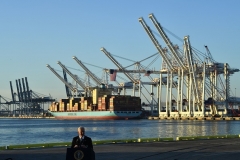
(CNSNews.com) - "Many people remain unsettled about the economy, and we all know why," President Joe Biden said during an appearance at the Port of Baltimore on Wednesday.
"They see higher prices. They go to the store online and they can't -- or they go to the store or go online, and they can't find what they always want and when they want it. And we're tracking these issues, trying to figure out how to tackle them head-on.
"My administration, with the help of the folks (longshoremen) on my left over here, is -- has a plan to finish the job of getting us back to normal from the pandemic and having a stronger economy than we ever had before."
In the course of his remarks, Biden acknowledged that because of him, "people have more money now," and that "creates a real problem" because with "more people with money buying product and less product to buy, what happens?...Prices go up," he said.
Biden was in Baltimore to sell his recently-passed bipartisan infrastructure bill -- along with his pending Build Back Better Act -- as the panacea for inflation, the supply chain, and even the labor shortage. He spoke on a day when inflation reached a 30-year high.
Biden said the bipartisan bill includes funding for five new inland ports in Georgia and North Carolina as well as money to improve the operation of other ports across the country.
"The challenge we need to meet here, and my plan is going to help address, has to do with the supply chain," he said. But improving port operations will take time.
Biden repeated something he's said before -- that the American people don't understand the supply chain logjam (although it's not that hard to figure out).
"You hear a lot about the supply chains in the news, but frankly, not a lot of people are clear -- have a clear understanding -- whether they have a Ph.D. here, they didn't go to school about how a supply chain works...let alone how to fix it. It's perfectly understandable because supply chains are incredibly complex."
He blamed the COVID pandemic for stretching global supply chains "like never before."
"And suddenly, when you go to order a pair of sneakers or a bicycle or Christmas presents for the family, you're met with higher prices and long delays."
Biden gave several examples of products that are produced with parts made in different countries, and the ripple effect that a factory closing in one place has on finishing and delivering the final product to another place.
And then Biden mentioned the relief payments and child tax credits -- for which he takes credit -- as being part of the problem:
If a climate disaster closed a port in China, it can delay shipment of furniture or clothing, reduce worldwide supply, and driving up prices here in America.
And the irony is, people have more money now. Because of the first piece of major legislation I passed -- they all got checks for $1,400, you got checks for a whole range of things.
If you're a mom and you have kids under the age of seven, you get $300 a month. And if it's over 7 to 17, you're getting $360 a month like wealthy people used to do when they get back tax returns. It changed people's lives. But -- what happens if there's nothing to buy? You got more money, you compete for getting it there -- it creates a real problem.
So, on the one hand, we're facing new disruptions to our supplies. At the same time, we're also experiencing higher demand for goods because wages are up, as well as people have money in the bank. And because of the strength of our economic recovery, American families have been able to buy more products.
And -- but guess what, they're not going out to dinner and lunch and going to local bars because of COVID. So, what are they doing? They're staying home, they're ordering online, and they're buying product. Well, with more people with money buying product and less product to buy, what happens?...Prices go up.
So, we got nearly 20 percent more goods coming into the country than we did before the pandemic struck. In 19 days -- excuse me, COVID-19 has changed the way we spend our time and our money. More products are being delivered than ever before.
That's because people have little more breathing room than they did last year, and that's a good thing. But it also means we got higher demand for goods at the same time we're facing disruptions in the supplies that make those goods. This is a recipe for delays and for higher prices, and people are feeling it. They're feeling it.
So, everything -- keep paying this much for a gallon of gas. In some parts of California, they're paying $4.50 a gallon. That's why it's so important that we do everything in our power to stabilize the supply chain...
Yet Biden wants to inject trillions upon trillions into the economy -- more money chasing more goods. He's now plugging part two of his "infrastructure" agenda, the Build Back Better Act, with all its new entitlement and spending programs.
BIDEN'S BILLIONAIRE CRONIES PAY LESS THAN 3% TAX RATE! IT PAYS TO OWN A PIECE OF JOE BIDEN! - COMMON MAN'S FRIEND FROM STANTON...LOL
Ask Prof Wolff: Taxing Billionaires
BIDEN CRONY JEFF BEZOS OF AMAZON SAYS HE CAN’T AFFORD TO PAY LIVING WAGES!
HERE’S WHY:
https://www.youtube.com/watch?v=lTYfJwTuP4A
Inside Jeff Bezos' $175 Million Mansion
This is because despite all its declarations, the Democratic Party is not a party of workers. It, as Biden’s transition team attests, is a party of Wall Street, big banks, Amazon, and the military-industrial complex.
Wealth-X report: Billionaire wealth surged during pandemic
A new report from research firm Wealth-X found that the global COVID-19 pandemic has intensified the growth of social inequality and witnessed an unprecedented accumulation of wealth among the most privileged layers in society. For the first time in human history, the world had more than 3,000 billionaires in 2020.
This amounts to a 13.4 percent increase in billionaires since 2019, currently totaling 3,204 individuals, with a median wealth of $1.9 billion. Billionaires’ collective wealth swelled to $10 trillion, a 5.7 percent increase from 2019.
Amazon CEO Jeff Bezos (AP Photo/John Locher, File)
“Viewed in aggregate, the global pandemic delivered a windfall to billionaire wealth, boosted by the flood of monetary stimulus and swelling profits in key sectors that coined a new wave of younger, self-made billionaires,” the report said.
Billionaire wealth has increased steadily since 1990, but one-third of these wealth gains have occurred during the pandemic. US billionaire wealth increased nineteen-fold over the last 31 years, from an inflation adjusted $240 billion in 1990 to $4.7 trillion in 2021.
The parasitic growth in wealth was most pronounced in the United States, the center of world capitalism. The ranks of billionaires in all of North America grew by 17.5 percent from last year. In fact, North America’s 980 billionaires account for 30.6% of the world’s billionaires.
The US was the top billionaire country in 2020. According to a report from Americans for Tax Fairness (ATF) and the Institute for Policy Studies Program on Inequality (IPS), American billionaires have seen their collective wealth surge by 62 percent, approximately $1.8 billion, since March 18, 2020. Following North America, Asia saw its number of growing by 16.5%, for a grand total of 883. Asia’s billionaires saw their collective net worth grow to $2.6 trillion, a 7.5% increase.
The good fortune of this tiny layer of the world’s population over the past 18 months is all the more appalling when contrasted to the growing immiseration and impoverishment of billions of workers around the globe. As a few thousand billionaires amassed enormous sums of wealth, workers around the world lost $3.7 trillion in earnings during the pandemic, according to a report from the International Labor Organization (ILO).
The report estimated an 8.8 percent year-by-year decline in global working hours from 2019 to 2020, equivalent to 255 million full-time jobs. This is approximately four times greater than the recorded loss during the 2008-09 global financial crisis.
The lost working hours were due to massive cuts in working hours and unprecedented levels of job loss, impacting some 114 million people and their families. Significantly, 71 percent of these job losses came from “inactivity,” meaning at least 81 million people around the world left the labor market because they could not find work.
Women have been more adversely affected by the pandemic than men. Globally, employment losses for women stand at 5 percent, versus 3.9 percent for men. Women were much more likely than men to drop out of the labor market, most commonly due to childcare concerns. Younger workers have also been devastated. Employment fell by 8.7 percent among workers aged 15-24 years old, compared to 3.7 percent for adults. Generation Z, the oldest of whom is 23, has become the most unemployed generation and is on track to experience the same financial struggles as millennials.
In the US alone, the official poverty rate rose by 1.0 percent from 2019 to 2020, according to the US Census Bureau. The poverty rate grew to 11.4 percent, marking the first increase in the official poverty rate after five years of consecutive decline. In 2020, there were 37.2 million people in poverty, approximately 3.3 million more than in 2019.
At the same time, median household income in 2020 dropped by 2.9 percent from the previous year. This is the first statistically significant decline in median household income since 2011.
Over 86 million Americans have lost jobs, almost 38 million have been sickened by the virus, and over 675,000 have died from it. Between 2019 and 2020, the real median earnings of all workers fell by 1.2 percent. The total number of people reporting earnings decreased by about 3 million, while the number of full-time, year-round workers decreased by approximately 13.7 million.
The chief obstacle to solving the world’s burning social questions—whether the devastating impact of COVID-19 or the widespread growth of poverty—is the private profit interests of the capitalist ruling class. Every action these vultures have taken in response to the pandemic has been driven by the effort to protect the wealth and privileges of a few. To save lives and avert even further disaster, workers must fight for a policy based on the interests of the working class, the vast majority of society.
Amazon Pushes for Indirect Taxpayer Subsidy Through USPS Handout
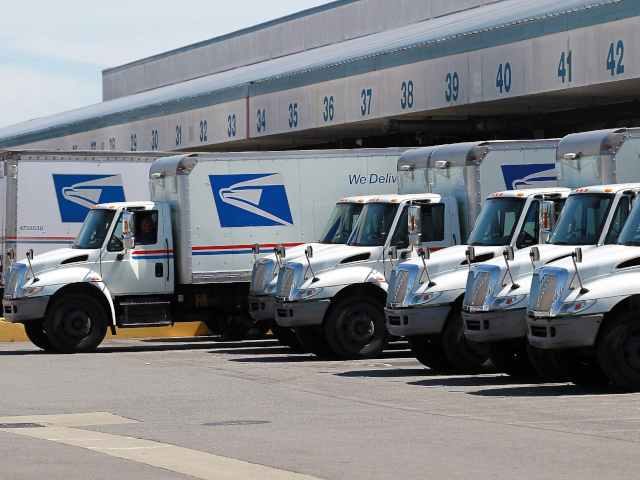
Technology giant Amazon is pushing, through its lobbying organs, to keep its USPS shipping rates artificially low, an indirect taxpayer subsidy to the market-dominating online retailer that comes at the expense of both small businesses and other customers of the USPS mail service.
Amazon has long relied on cheap shipping rates from USPS to avoid taking on the cost of building its own logistics network. In 2019, Bezos summed up the importance of USPS to his business, saying, “I didn’t have to build a transportation network to deliver the packages. It existed: It was called the post office.”
Primarily through the Package Coalition, which Amazon funds, Amazon lobbies to keep USPS package shipping rates artificially low. This lobbying campaign for below-market shipping rates has intensified even as the demands on the USPS have ratcheted up in recent years due to the rapid rise of e-commerce shipping, a trend that was accelerated by the coronavirus pandemic.
This has come at a cost to customers of the traditional USPS mail service. Increased demands from package shippers like Amazon have forced the USPS to re-allocate resources from mail delivery to package delivery.
Analysts have confirmed that the USPS uses its traditional mail service, along with its tax exemptions and access to treasury loans to support its surging package delivery business. Meanwhile, delivery times in its traditional mail service continue to stagnate.
By lobbying to keep USPS package shipping rates artificially low, while at the same time dumping its unprofitable business – i.e. rural delivery – onto the USPS, Amazon and the Package Coalition are bankrupting the USPS.
During coronavirus, the taxpayers provided $10 billion in relief funding to the USPS. Amazon and the Package Coalition aggressively lobbied for the money, which was quickly used to cover the demands of package shipping.
When taxpayers come to the rescue, as they did during the pandemic, and as the Amazon-funded Package Coalition is asking them to do so again with another huge taxpayer bailout, Amazon is likely to be the beneficiary.
Allum Bokhari is the senior technology correspondent at Breitbart News. He is the author of #DELETED: Big Tech’s Battle to Erase the Trump Movement and Steal The Election.


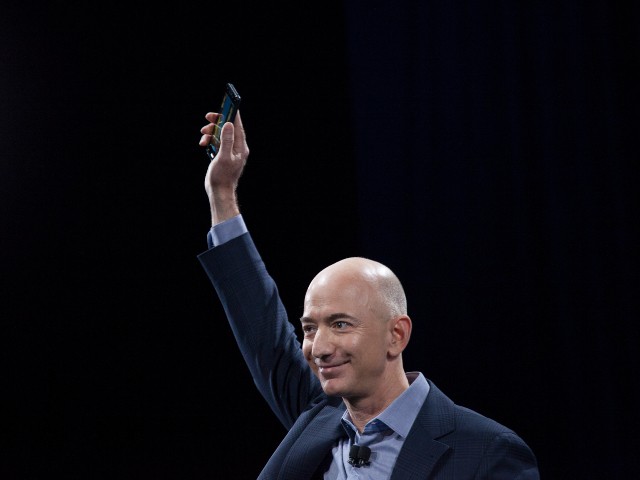
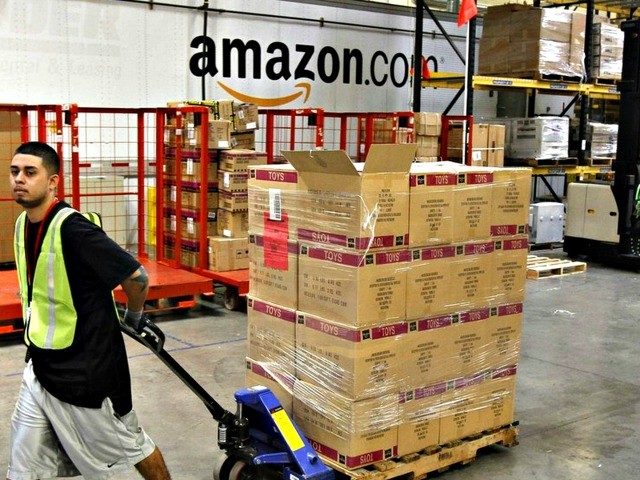
No comments:
Post a Comment